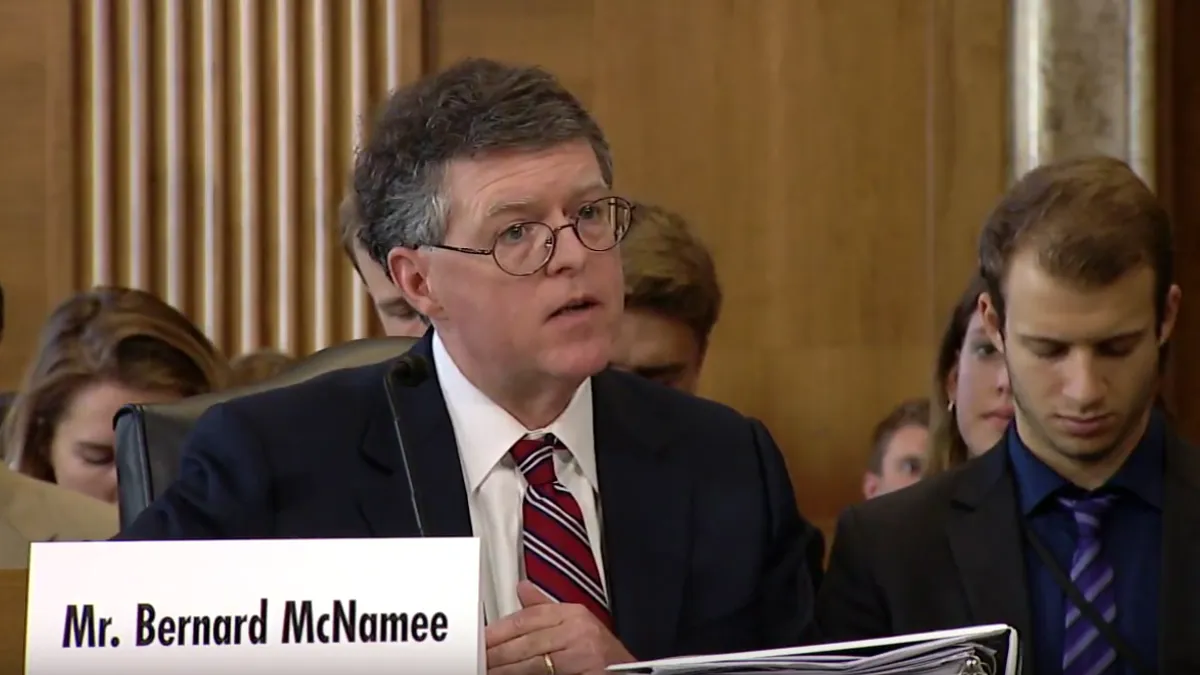Dive Brief:
-
Ten state attorneys general on Monday urged Federal Energy Regulatory Commissioner Bernard McNamee to recuse himself from the agency's proceeding on grid resilience, writing it is too similar to past FERC debates over a coal and nuclear bailout plan he helped design.
-
The officials argued the resilience docket "replicate[s] or closely resembles" the debate over the the Department of Energy's Grid Resilience Pricing Rule, rejected in early 2019. That's the standard FERC ethics lawyers said this month could trigger a recommendation for McNamee's recusal.
-
The request comes after Senate Democrats asked McNamee to recuse himself from the resilience docket and a broad swath of generation issues due to his DOE work and filmed comments of him criticizing renewable energy. Even if ethics officials recommend a recusal, the final decision lies with the Commissioner.
Dive Insight:
The attorneys general filing Monday afternoon shows rising scrutiny over McNamee's role in FERC's grid resilience docket after his part in crafting the DOE proposal that sparked the proceeding.
Proposed in Sept. 2017, DOE's resilience proposal would have provided cost recovery to plants that can keep 90 days of fuel onsite — largely benefiting coal and nuclear generators.
McNamee, the head of DOE's policy office at the time, helped design the proposal and signed the cover letter on the documents sent to FERC.
FERC unanimously rejected the proposal in January 2018, setting up a broader proceeding on grid resilience that is still open at the commission.
After he was confirmed to FERC in December, Senate Democrats, environmental groups and Harvard law researchers filed comments at the commission asking the new regulator to recuse himself from the broader resilience proceeding.
McNamee responded this month, sending senators his communications with FERC ethics officials that indicated he would recuse himself from any lingering discussions on the original DOE proposal, such as a vote on whether to rehear the case.
The correspondence did not indicate, however, that McNamee would sit out of the broader resilience proceeding. There, FERC ethics lawyers wrote that they would monitor comments filed in the docket and recommend recusal if they "replicate or closely resemble" the proceeding on the original bailout plan.
The attorneys general reference that standard, arguing the resilience proceeding — which contains comments from coal and nuclear owners that resemble their bailout arguments — is already similar to the original docket.
"Here, the Commission is evaluating 'the resilience of the bulk power system' and 'whether additional Commission action regarding resilience is appropriate at this time,'" they wrote. "In the [DOE bailout proceeding], the Commission also considered the resilience of the bulk power system and, specifically, whether establishing a mechanism to increase resiliency was warranted."
McNamee's role in that original docket shows he "has already determined that additional Commission action to subsidize uneconomic and polluting fossil fuel resources is appropriate and necessary for the resilience of the bulk power system," they added.
Led by Massachusetts Attorney General Maura Healey, the letter was signed by nine other Democratic attorneys general from California, Maryland, New York, Michigan, Oregon, Illinois, Minnesota, Vermont and the District of Columbia.
McNamee has not yet indicated whether he will recuse himself from the broader resilience docket, which is more than a year old. In December, FERC Chairman Neil Chatterjee defended his colleague, saying he should be given "the opportunity to demonstrate ... that he will be an earnest public servant."













